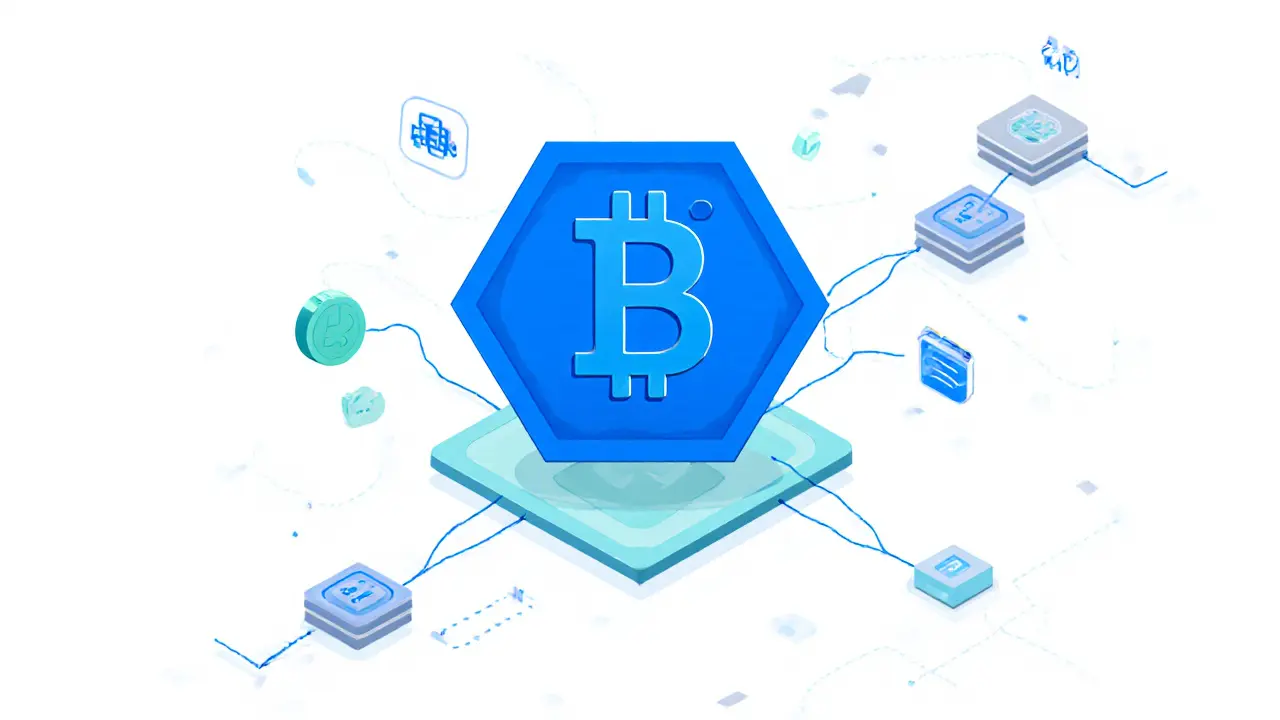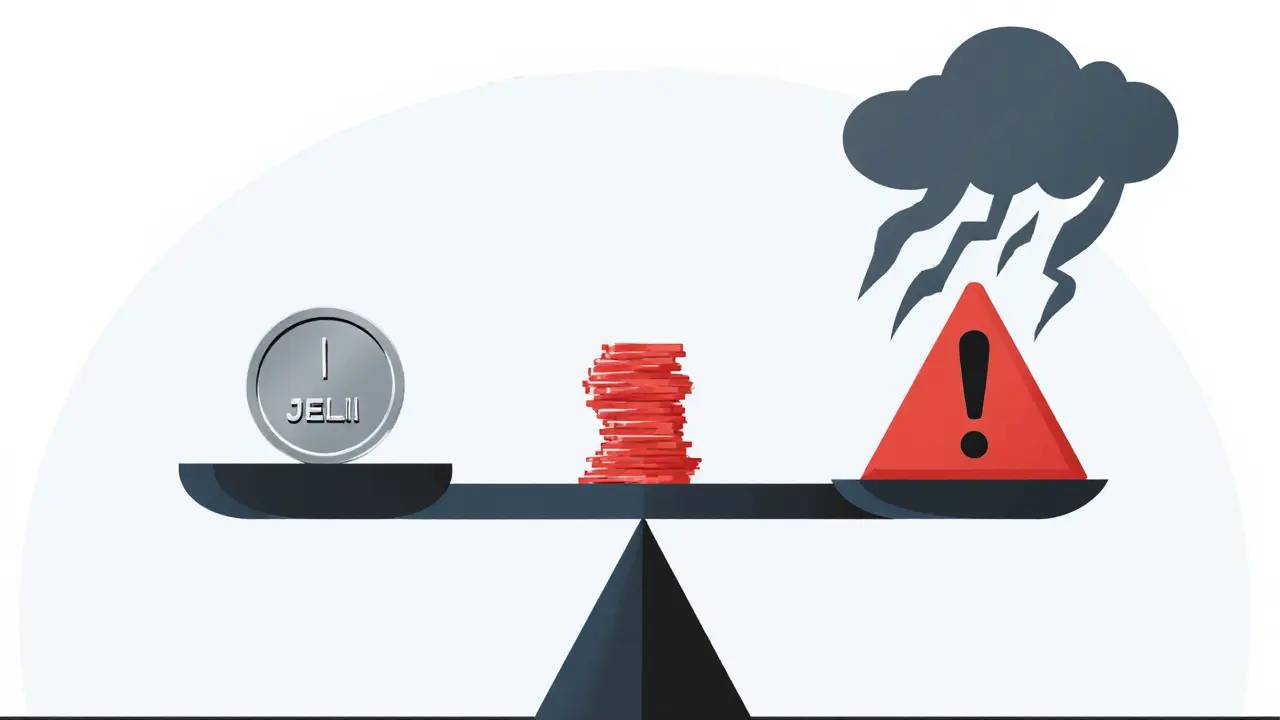JELLI (JELLI) Crypto Coin Explained: Basics, Tokenomics, and Risks
 Aug, 12 2025
Aug, 12 2025
JELLI Token Value Calculator
Current Market Data
$0.000319
$0.0002416
$30-$160
$73,157
$70,090
Extremely Low
Token Value Calculator
Key Takeaways
- JELLI is an ERC‑20 utility token on the Base Layer‑2 network with a fixed supply of 210 million.
- Current market cap hovers around $73k, making it a micro‑cap with very low liquidity.
- Price data varies widely across trackers; volatility can exceed ±20% in a single day.
- The token powers the jelli.blue platform that claims to link Web3 projects with community members.
- Investors should treat JELLI as high‑risk due to scarce trading volume, limited exchange listings, and unclear development activity.
What Is JELLI?
When you see the name JELLI (JELLI) token is a utility token built on the Base blockchain, designed to serve as the native currency for the jelli.blue platform. The platform says it helps Web3 projects run community‑driven campaigns, rewarding participants with JELLI tokens for completing tasks like social sharing or beta testing.
Where Does JELLI Live?
The token follows the ERC‑20 standard, which means it inherits the security model of Ethereum while benefiting from Base's lower gas fees and faster settlement. Base is Coinbase’s Layer‑2 solution that runs on Optimism’s roll‑up technology, offering cheaper transactions compared with main‑net Ethereum.
Technical specifics such as the smart‑contract address are not publicly listed on major explorers, a red flag for anyone wanting to verify the code. However, the token’s compatibility with ERC‑20 makes it tradeable on any wallet that supports the Base network, like MetaMask or Coinbase Wallet.
Token Supply & Economics
JELLI has a hard‑capped total supply of 210,000,000 tokens. No additional emissions are planned, so the supply is non‑inflationary. The current circulating supply is essentially the total supply because the project has not locked a significant portion of tokens for future use.
With a market cap of roughly $73,000, the Fully Diluted Valuation (FDV) sits at about $70,090, meaning the token trades far below its theoretical maximum value. This huge discount can be tempting, but it also reflects the lack of demand and liquidity.

Current Market Data (Oct 24 2025)
| Metric | Value |
|---|---|
| Price (CoinPaprika) | $0.000319 |
| Price (CoinGecko) | $0.0002416 |
| 24‑hr Volume (CoinPaprika) | $158.70 |
| 24‑hr Volume (CoinGecko) | $31.75 |
| Market Cap | $73,157 |
| FDV | $70,090 |
| Current Exchange | Uniswap V3 (Base) |
Notice the stark difference between price feeds. Such discrepancies are common for tokens that only trade on a single decentralized pool.
Where Can You Trade JELLI?
The only active market is the Uniswap V3 pool on Base. Because there is just one liquidity pool, slippage can be severe - even modest buys may move the price noticeably. No centralized exchanges list JELLI, so you’ll need a Web3 wallet, some Base‑compatible ETH, and a bit of patience to navigate the DEX interface.
Use Cases and Utility
JELLI’s stated purpose is to reward participants in campaigns run on jelli.blue. In theory, a project could create a bounty, users complete the task, and the platform disburses JELLI tokens automatically. However, publicly available documentation is sparse; there are no whitepapers, GitHub repos, or demo videos to show the flow in action.
Compared with more established Web3 engagement platforms like Galxe or Layer3, JELLI offers no proven track record, no partner ecosystem, and virtually no community chatter.

Risk Profile
Investors should treat JELLI as an extreme‑risk micro‑cap. Key concerns include:
- Liquidity: Daily volume is under $200, well below the 5‑10× turnover rule for stable markets.
- Price Manipulation: With one pool, large orders can swing the price by 15‑20% in minutes.
- Transparency: No audited code, no roadmap, and no official social channels.
- Regulatory Uncertainty: As a utility token with unclear functionality, it could be deemed a security in certain jurisdictions.
- Competition: Established players already dominate the Web3 campaign space.
If you’re looking for a speculative gamble, JELLI fits the bill. If you need a reliable reward token for a community, look elsewhere.
How to Acquire JELLI (If You Still Want To)
- Set up a Web3 wallet that supports Base (MetaMask is the easiest).
- Transfer a small amount of Base‑compatible ETH to cover gas.
- Visit the Uniswap V3 interface, select Base as the network, and paste the JELLI contract address (if you have it).
- Enter the amount you wish to swap, review the slippage tolerance, and confirm the transaction.
Because the pool is tiny, consider using a limit order or buying in very small increments to avoid moving the market.
JELLI vs. Typical Micro‑Cap Tokens
| Aspect | JELLI | Typical Micro‑Cap |
|---|---|---|
| Supply | 210 M (fixed) | Varies, often 100 M‑500 M |
| Market Cap | ~$73 k | $50 k‑$200 k |
| 24‑hr Volume | $30‑$160 | $500‑$5 k |
| Exchange Listings | 1 DEX (Uniswap V3) | 1‑3 DEXes, occasionally a small CEX |
| Community Presence | None documented | Small Discord/Twitter groups |
| Utility | Reward token for jelli.blue (unverified) | Varies - often speculative only |
The table shows JELLI sits at the low end of liquidity and community engagement, making it riskier than many peers that at least have a modest Discord or Telegram.
Bottom Line
If you’re curious about the JELLI (JELLI) crypto coin, you now know its supply, where it lives, how thin its market is, and why the token’s utility claims are hard to verify. The data points to a project that is still in an experimental stage, with price swings that can wipe out small positions fast. Treat any investment as a high‑risk bet, and only allocate money you can afford to lose.
What blockchain does JELLI run on?
JELLI is an ERC‑20 token built on the Base Layer‑2 blockchain, which is a roll‑up solution on top of Ethereum.
How many JELLI tokens exist?
The total supply is fixed at 210 million tokens, and all of them are considered to be in circulation.
Where can I buy JELLI?
JELLI only trades on the Uniswap V3 pool on Base. You’ll need a Web3 wallet, some Base‑compatible ETH for gas, and the contract address to swap.
Is JELLI a good long‑term investment?
Given its tiny market cap, low liquidity, lack of audited code, and unclear roadmap, most analysts label JELLI as an extreme‑risk, speculative token. It’s not recommended for stable, long‑term holdings.
What is the purpose of the JELLI token?
The token is meant to reward participants in campaigns run on the jelli.blue platform, which claims to connect Web3 projects with community members. Actual usage examples are scarce.
Lena Novikova
October 25, 2025 AT 05:44Derajanique Mckinney
October 26, 2025 AT 00:53Olav Hans-Ols
October 26, 2025 AT 10:44Rosanna Gulisano
October 27, 2025 AT 04:08MICHELLE SANTOYO
October 27, 2025 AT 06:37Paul Lyman
October 28, 2025 AT 01:20Dr. Monica Ellis-Blied
October 28, 2025 AT 08:44Saurav Deshpande
October 28, 2025 AT 21:28gurmukh bhambra
October 28, 2025 AT 22:39Sheetal Tolambe
October 29, 2025 AT 03:34Kevin Johnston
October 29, 2025 AT 05:24Sunny Kashyap
October 29, 2025 AT 07:36Herbert Ruiz
October 29, 2025 AT 18:31Frech Patz
October 30, 2025 AT 10:40